Broadcasting
FCCPC Engages MultiChoice over DStv/GOtv Subscription Increase

Federal Competition and Consumer Protection Commission (FCCPC) has said it is engaging pay television company, MultiChoice Nigeria, for clarity over the increase in subscription rates.

Mr Babatunde Irukera, executive vice chairman of FCCPC, said this while speaking with the News Agency of Nigeria (NAN) in Abuja on Wednesday.
Irukera said the engagement was to check whether the company implemented a change in terms and conditions in line with the Commission’s mandated steps.
According to him, our orders were broad and it will be important that compliance is prioritised.
“Although we cannot, and did not regulate price except in limited circumstances requiring presidential approval and gazetting.
“As such, our order to MultiChoice did not prevent them from pricing their services in a manner acceptable between them and their subscribers.
“We regulate price gouging. The nature of gouging is post-fact, meaning that when a price movement occurs, we can investigate to determine if it is excessive, exploitative, unrestored or manifestly unjust.
“Such is a very intricate investigation and the fact of the existence of any increase is not the entire evidence.
“There is a method to analyse the increase and other circumstances leading to it.
“As in the case of pharmacies, we are prosecuting for inordinate increases of certain products during early stages of the COVID-19 pandemic.
“For now, the first check with MultiChoice is whether they implement, or intend to, a material change in terms and conditions (of which price is one) without the steps the Commission has mandated as conditions precedent,’’ he said.
Recall that MultiChoice on Tuesday, announced the increase in DStv and GOtv subscription rates, blaming it on the rising cost of inflation and business operations.
The rates are Xtraview +PVR access fee formerly N2,300, now N2,900, Business will now go for N2,669, Padi formerly N1,850 will now be N2,150, Yanga formerly N2,565 will now be N2,950, Confam formally N4,615 will now be N5,300.
Also, Compact formerly N7,900 will now be N9,000, Compact Plus formerly N12,400 will now be N14,250, while Premium which was N18,400 will now go for N21,000.
Broadcasting
5 Must-Have Fresh Foods to Supercharge Your Child’s Nutrition

By Diana Tenebe, Chief Operating Officer, Foodstuff Store
Proper nutrition is fundamental for the well-being and development of our young ones. It provides the essential building blocks they need to grow, thrive, and reach their full potential. Unfortunately, many Nigerian children face significant nutritional challenges.

In 2024, UNICEF reported that approximately 11 million Nigerian children under five are experiencing severe child food poverty. This alarming figure means that one in every three Nigerian children under five falls into this category. This substantial burden is attributed to a combination of factors, including conflict, climate change, and inequity.
There’s also a tendency for parents to prioritise a limited number of food items in diets for their children, often due to economic factors, historical influences, and cultural preferences. This can lead to less diverse diets and potential nutritional deficiencies. Surprisingly, the food items that can help supercharge a child’s nutrition are not always the ones you would initially consider.
Here are five readily available fresh foods in Nigeria that are perfect for boosting your child’s health:
Oranges (and other Citrus Fruits): Bright, juicy, and sweet, oranges are a favorite among children, and for good reason! They are packed with Vitamin C, an essential nutrient that boosts the immune system, helps the body absorb iron, and is crucial for healthy skin and gums. Beyond oranges, consider other local citrus fruits like tangerines and grapefruits, which offer similar benefits. A glass of freshly squeezed orange juice or a few segments as a snack are fantastic ways to incorporate this vital vitamin into their day.
Spinach (Efo Tete) and other Leafy Greens: Often referred to as ‘power foods,’ leafy green vegetables like spinach (efo tete), fluted pumpkin leaves (ugu), and African basil (efirin) are nutritional goldmines. They are rich in vitamins A, C, and K, as well as folate and iron. These nutrients are vital for healthy vision, strong bones, proper blood clotting, and preventing anaemia – a common concern among children. Parents can incorporate them into soups, stews, or even a delicious vegetable smoothie to make them more appealing to their children.
Sweet Potatoes: A versatile and naturally sweet root vegetable, sweet potatoes are a fantastic source of complex carbohydrates for sustained energy, dietary fiber for digestive health, and beta-carotene (which converts to Vitamin A in the body). Unlike white potatoes, their higher nutritional profile makes them an excellent choice for growing children. They can be boiled, roasted, mashed, or even made into healthy fries as a wholesome alternative to processed snacks.
African Pear (Ube): This seasonal favorite is more than just a tasty snack; it’s a nutritional powerhouse! African pear (ube) is rich in healthy fats, which are essential for brain development and energy. It also contains good amounts of fiber, potassium, and calcium. Often boiled or roasted with corn, ube is a convenient and nutritious whole food that children would enjoy, providing healthy fats without the need for processed alternatives.
Garden Eggs (A Nwa Anyara): Widely consumed across Nigeria, garden eggs are a humble yet highly nutritious vegetable. They are an excellent source of dietary fiber, which aids digestion and promotes a feeling of fullness, helping to manage healthy weight. They also contain vitamins B1 and B6, potassium, and magnesium. Whether eaten raw with groundnut paste, added to stews, or incorporated into a child-friendly sauce, garden eggs are a great way to boost nutrient intake.
These fresh, local foods, when regularly included in a child’s diet, are key to providing the energy, boosting their immune system, and supplying the crucial nutrients required for them to flourish into healthy, vibrant individuals ready for the future.
Broadcasting
Luft Pay TV Launches in Lagos, Promises to Revolutionize Entertainment

Luft Pay TV has officially launched in Nigeria’s Pay TV landscape, bringing a fresh perspective to home entertainment.

Officials of Luft Pay TV at the launch
The brand’s dynamic debut in Lagos recenlty, drew media executives, content creators, industry stakeholders, and entertainment enthusiasts.
Yemi Adebowale, head of Corporate Communications and Media at Luft Pay TV, emphasised the brand’s mission to simplify entertainment and provide real value. “Luft Pay TV is more than just another player in the market.
He said, “We’re here to simplify entertainment, eliminate confusion around billing, and provide real value with high-definition content that reflects both global quality and local identity.
Luft Pay TV’s standout feature is its all-in-one subscription model, offering over 35 premium channels for ₦7,500 per month.
The channel lineup includes Sports, Live sports action, Movies: Nollywood and Hollywood films as well as Kids’ Programming, Documentaries, Music and Lifestyle content.
“Decoder and STB Kit Prices: Decoder: ₦25,000 – Complete STB kit with accessories: ₦35,000. As a proudly Nigerian brand, Luft Pay TV is committed to promoting local storytelling through partnerships with indigenous content creators.
“This initiative aims to project African stories globally and provide an inclusive, affordable, and proudly African entertainment experience to Nigerians everywhere.”
Luft Pay TV has commenced nationwide installations across the six geopolitical zones, supported by a growing distribution network and robust customer service infrastructure.
This ensures a seamless user experience for subscribers
With its innovative approach and commitment to Nigerian talent, Luft Pay TV is poised to revolutionise the television experience in Nigeria.
Broadcasting
When Legacy Meets Preparedness – Olusegun Alebiosu as CEO, Firstbank Group

By Aniekan Ezekiel
What happens when legacy meets preparedness? What results from such a combination? Let us not be in a hurry to put forward any answers yet. Instead, let us consider first the opposite situation: When legacy meets unpreparedness.

The world abounds in examples of this distressing situation. A dynasty that has built wealth from generation to generation, with its illustrious heirs providing generational leadership, finds itself in a strange phase where an ill-prepared heir takes over the reins and in that same generation, not the next, wipes out the entire family fortune built over several generations.
We see the same thing with nations. History is replete with examples of great nations built by great leaders, which slid into oblivion when they were hit by arguably the greatest misfortune that ever befalls humanity – bad leadership. It is the reason American author and leadership expert John Maxwell asserts, “Everything rises and falls with leadership.”
As with nations, so with organisations. We see organisations that have thrived for decades and over several generations, get a new leader who is not prepared for such leadership, and the leader pushes the organisation to the brink of collapse.
Contrast this picture with the situation at Nigeria’s most enduring corporate organisation with the most amazing legacies of firsts, First Bank of Nigeria Limited, which witnessed a leadership transition about a year ago. Faced with a number of quality options in and outside the then management team, the decision-makers at the bank and its parent company FBNHoldings, now First HoldCo Plc, had to be clear-minded about who could become the new Chief Executive Officer of FirstBank Group.
Equally important as the need for continuity was the non-negotiable requirement for capacity to manage the ship of the 130-years-plus institution to sustain its enviable legacies and consolidate the gains made in recent years. The search was for someone with a steady head and hands (talk of risk control and mitigation), in addition to an excellent track record of sterling performance and achievements.
Fortunately, fate was on their side. They did not have to look outside. Right there before them was someone who understood all kinds of risks and how to control and mitigate them. He had been with FirstBank since 2016 when he joined as Group Executive / Chief Risk Officer. Then in January 2022 he was elevated to Executive Director / Chief Risk Officer and Executive Compliance Officer.
This man has given nearly three decades of his working life to the banking and financial services industry. He has under his belt a rich tapestry of cross-functional experience in credit risk management, financial planning and control, credit and marketing, and trade. His cross-functional exposure also includes corporate and commercial banking, agriculture financing, oil and gas, transportation, including aviation and shipping, and project financing
Meet Olusegun Alebiosu, the man history had prepared and the one decision-makers chose among the quality options. He was appointed substantive Chief Executive Officer of FirstBank Group in June 2024, having acted in that capacity since April 2024 when the former CEO left.
Determined to build on the bank’s legacies while navigating the ever-changing landscape of the financial services industry, Alebiosu has shown unwavering commitment to lead the bank through a transformative period that places emphasis on strategic consolidation, technological advancement and market expansion.
Alebiosu’s approach to sustaining the legacies of firsts at FirstBank, which has been at the vanguard of accelerating Nigeria’s digital payments as the first bank to issue over 13 million cards to customers, draws from his vast professional experience which began with Oceanic Bank Plc, now Ecobank Plc, in 1991. Between then and joining FirstBank in 2016, he had worked at Coronation Merchant Bank as Chief Risk Officer, at African Development Bank Group as Chief Credit Risk Officer and at United Bank for Africa as Group Head, Credit Policy and Deputy Chief Credit Risk Officer.
Under one year of his appointment as substantive CEO of FirstBank, Alebiosu’s strategic consolidation efforts have demonstrated that he is a worthy successor, not an ill-prepared or unprepared one, proving the decision-makers right. Understanding the critical role of its human capital in sustaining the bank’s legacies, Alebiosu has invested himself and the bank’s resources in promoting staff welfare.
A comprehensive review of the bank’s compensation structure was undertaken to position it within the 75th percentile of the industry, making the bank more retentive of, and attractive to, the best talents. The highest number of staff promotions across various grades in the last five years has happened under Alebiosu’s watch, with 1,654 employees being elevated in one single promotion cycle.
Under his leadership, over 2,186 new hires have been recruited across key functions and subsidiaries, with a large number of them deployed to the sales function to ensure that retail customers are adequately served. Staff are now more engaged based on the high employee engagement score of 86% achieved in the April 2025 WorkBuzz survey, indicating remarkable progress in the bank’s multi-pronged efforts to promote a positive and inclusive workplace culture.
This drive to reinforce a culture of inclusion and recognition has been accentuated by the launch of a group-wide culture transformation initiative with the goal of embedding the core values of integrity, excellence and innovation. It has also been strengthened by a renewed focus on inclusion, collaboration and high performance. Also contributing was the staging of a FirstBank Employee Appreciation Day 2025 featuring, among others, a personalised appreciation video message from the CEO to all employees across the group throughout Africa and beyond. The inclusion message is further boosted by the launch of the inaugural edition of the bank’s pioneering initiative, Mandarin Language School, to bolster the bank’s expansion in the Asian market.
Expansion is a critical plank in FirstBank’s new strategic planning horizon, under Alebiosu’s leadership. Taking off this 2025, the plan seeks to reinforce the bank’s market dominance across all operational regions and it includes deliberate expansion into new markets within and outside Africa.
Beyond geographical and horizontal expansion, Alebiosu’s plan has also targeted a skyward expansion. Or how else does one describe the groundbreaking ceremony in March 2025 for the bank’s new green-certified, 44-storey iconic head office building in Eko Atlantic City, Lagos State?
Alebiosu is also prioritising the acceleration of process automation in recognition of the importance of digital transformation. It is a massive push for technological advancement that includes adopting robotics technology and artificial intelligence at scale, to give the bank an unassailable competitive advantage among its peers in the industry.
The bank has deployed digital tools to enhance seamless account opening and optimised backend systems and customer service delivery. Two additional Digital Experience Centres (DXCs) have been launched – one at Lekki Admiralty Way, Lagos State and the other at its UNN branch, Nsukka, Enugu State. Also, the bank’s agent network has expanded to over 280,000, a 50,000 increase from the 230,000 agents it had in 2023.
As expected, shareholders, among other stakeholders, have been observing the strides the bank has been making under Alebiosu’s leadership, with a keen eye on the numbers. Fortunately, again, the bank’s results for the financial year ended December 2024 speak volumes, with after-tax profit of its parent company rising to the highest point it has reached in the last 12 years, according to the company’s latest financial statement.
In recognition of his achievements within such a short period and his exemplary leadership, Alebiosu was honoured at the World Business Outlook Awards as “Banking CEO of the Year – Nigeria 2025”. He has also been honoured with the “Special African Banking Leadership Award” by African Leadership Magazine. This was in 2024.
The story of Alebiosu’s leadership at FirstBank has clearly been one of preparedness meeting legacy. Working with the board and management team, he has consistently sustained the bank’s legacies and also consolidated its recent gains in ways that will ensure the gains keep compounding. FirstBank, more than ever before, is poised for greater intra- and intercontinental growth and impact in the years ahead.

 E-Business3 days ago
E-Business3 days agoNigeria Launches Cybercrime Team with Commonwealth, UK Support

 Telecom3 days ago
Telecom3 days agoTelecom Subscribers Decline By 43m in One Year

 Telecom3 days ago
Telecom3 days agoNCC Orders Telcos to Compensate Subscribers for Outages More than 24 Hours

 E-Financial3 days ago
E-Financial3 days agoSERAP Drags CBN to Court over Alleged Failure to Disclose LG Allocations

 General News3 days ago
General News3 days agoHEDA Sues FG, Oil Giants over Alleged Unlawful Oil Licence Transfer

 Telecom2 days ago
Telecom2 days agoEngr. Ikechukwu Nnamani Receives Two Prestigious @ABoICT Awards

 Telecom3 days ago
Telecom3 days agoIHS Nigeria, NSCDC Partner to Protect Telecoms Infrastructure

 E-Financial2 days ago
E-Financial2 days agoEFCC Recovers over N20Bn Stolen by Hackers from 6 Banks in Nigeria
























